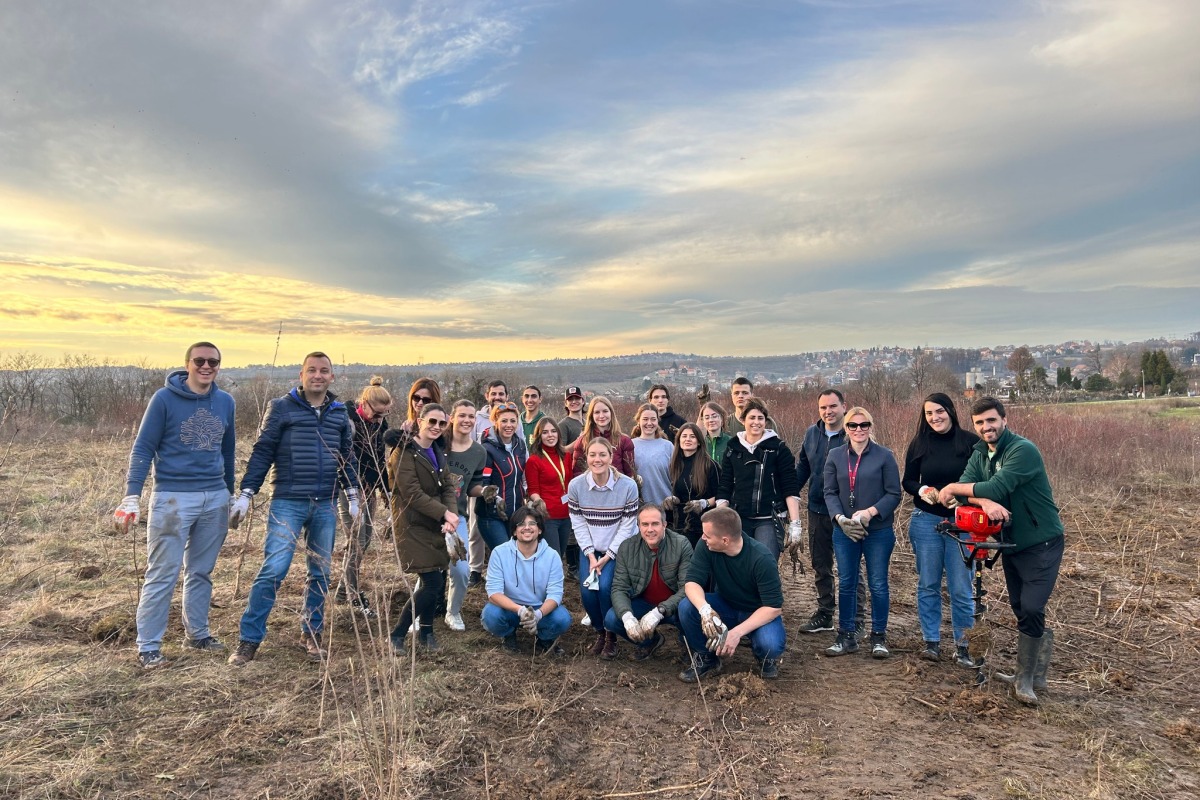Innovative solutions enhancing patient care and driving healthcare reforms

AstraZeneca has a strong presence in Serbia. Can you share how the company’s innovations in healthcare are specifically benefiting Serbian patients and the local healthcare system?
Let me start with the fact that AstraZeneca has been present in Serbia for more than 45 years and currently we are among the top innovative pharmaceutical companies in the country. In the last two years the team has doubled and now more than 100 professionals are dedicated to support Serbian healthcare system and patients. In other words, historically we are partnering with the local authorities sustainably and as of today we continue to be committed to contributing to healthcare reforms and improving patient outcomes in Serbia. Our focus is on increasing access to cutting-edge treatments and therapies for patients in the region. We work closely and day-to-day with healthcare professionals, regulatory authorities, and policymakers to ensure that innovative medicines are available to those who need them. We are supporting Serbian patients in several major therapeutic areas including Oncology, Cardiovascular, Renal & Metabolism, Respiratory Diseases, as well as Vaccines & Immunology. Since 2022 we have also established our Rare Diseases unit and are already helping such patients and their families too.
Serbia is undergoing significant reforms in its healthcare system. How is AstraZeneca contributing to these efforts, particularly in areas like improving patient outcomes and access to cutting-edge treatments?
We are witnessing a wave of new therapeutic solutions that transform the outlook for patients in a positive direction. The share of the population over the age of 65 is increasing globally and Serbia isn’t an exception. Thus, there’s a significant increase in both chronic and oncological diseases. In partnership with country’s institutions, we are working towards changing the way of thinking about healthcare to meet society’s expectations. Health care spending, particularly for prevention, early diagnosis and access to innovative therapy, is a public investment, both in the well-being of citizens and in economic future. Better health leads to prosperity. Healthier people enjoy longer and more productive working lives and spend less on health care. Through our early access programs, we give Serbian patients the opportunity for free treatment with the company’s innovative products, which are not yet reimbursed by the healthcare system. As mentioned above, following the related regulations and in constant open dialogue with the institutions, we ensured access to treatment for patients with a number of oncological, cardiovascular, pulmonary, nephrological, rheumatological and rare diseases. On a global perspective, earlier this year we presented our „Ambition 2030″ program, where we stated that we will launch 20 new medicines in that period. And our local team is here to boost these new treatments to enter timely Serbia and ensure that the patients who need them to have the proper access to them.
The role of digital healthcare has grown in recent years. What is AstraZeneca doing to promote digital health solutions in Serbia, and how are these solutions helping to improve the early diagnosis and treatment of chronic diseases?
We recognize the growing importance of digital healthcare and here I can again build on global practices in this direction that we are implementing on local markets as well. Our big focus is on Data Analytics and AI to support analyzing large datasets for early disease detection and personalized treatment approaches. These technologies can help identify patterns and trends that contribute to early diagnosis and intervention for chronic diseases. This is why we are closely partnering with tech companies and startups. With their support we integrate digital health solutions into disease management. These collaborations could involve the use of wearable devices, telemedicine platforms, or data-driven insights to improve patient outcomes. Utilizing omnichannel campaigns we provide Serbian healthcare professionals with digital resources and training programs to enhance their understanding and application of digital health solutions in the early diagnosis and treatment of chronic diseases.

We are also very proud that for a second consecutive year we were hosting Health Hackathons in Serbia too, as part of Balkans HealthHackaton program. This is a project fully supported by AstraZeneca Balkans in collaboration with respective local partners and it aims to inspire and empower the next generation of healthcare innovators to foster new solutions. Over two days, students from biomedical, business, and technical backgrounds were tasked with devising practical solutions for real-world health challenges. Great projects were presented, and more than 30 students from Serbia took part in this year’s edition. Majority of them also joined our Balkans Internship program, showcasing high interest to develop their career in an innovative pharmaceutical company.
Collaboration between the private sector and public health institutions is key to advancing healthcare. Can you share any recent partnerships AstraZeneca has formed in Serbia to enhance healthcare services, research, or educational programs for healthcare professionals?
There are many projects that can be mentioned in this regard, but I can highlight few of them like Breast Cancer Policy shaping project that is developing in collaboration between the Ministry of Health, Swedish Embassy and Business of Sweden. As part of this partnership, in less than a month, a Breast Cancer Academy with Swedish experts will take place in Serbia. They will share knowledge and experience with our healthcare professionals and institutions on how to improve screening, early diagnostics, access to therapy and patient support programs.
AstraZeneca has been present in Serbia for more than 45 years and is among the top innovative pharmaceutical companies in the country
In September 2023, together with the Serbian government we signed a Memorandum of Understanding confirming our participation in the Bio4 campus. This will involve the roll-out of three strategically important initiatives: the agreement to support genetic testing for BRCA mutations in early breast cancer patients, the use of AI in screening for early lung cancer detection and establishing a research and development department in Serbia. Another recent and meaningful example is the early CKD diagnosis project that is happening in partnership with the Serbian society of nephrologists. Through it, based on lab data, GPs are receiving clear instructions how to guide and manage risk patients.
AstraZeneca has a strong global focus on sustainability. How does this commitment translate into concrete actions in Serbia, particularly in terms of promoting environmental sustainability and ensuring equitable access to medicines?
That’s correct. As a global leader, we at AstraZeneca understand our key role to play in addressing the biggest environmental challenges of our time. This is why we have a strong sustainability agenda focused on three major priorities: access to healthcare, environmental protection, and ethics and transparency. We are also following the UN’s Global Sustainable Development Goals and are committed to have a negative carbon footprint by 2030 through different initiatives, including planting 200 million trees under AZ Forest program across six continents by that time. In this regard, earlier this year it was announced that globally we will invest $400 million AZ Forest. Alongside Bulgaria, Croatia, Slovenia and Montenegro, Serbia is highly contributing to AZ Forest program and the trees planted on the territory of the Balkan cluster exceeds 10,000, which equals the absorption of avg. 250 000kg of CO2 per year. And by the end of this year, we will try to double that number.
We work closely with healthcare professionals, regulatory authorities, and policymakers to ensure that innovative medicines are available to those who need them
To boost our ambitious sustainability agenda, a big number of initiatives are organized in Serbia and the Balkan Cluster, of which we are part. We are committed to have a fully electric fleet by 2025 and even though the infrastructure in our countries is quite challenging, I am very proud with the team’s motivation and drive to support this action. In addition, for more than two years we are supporting the bee population by adopting hives and helping local bee organizations. With our efforts till today half a million bees are protected, which pollinated over 1 billion plants. During this spring-summer season, our colleagues initiated cleaning initiatives through which more than 3000 L of garbage was collected.
Another program that is part of our sustainability agenda is Young Health Program. It aims at supporting young people to have a better understanding of the importance of a healthy lifestyle and habits. In Serbia we launched the program in 2021 with focus on smoking prevention among young people and as of this year we started series of initiatives that are building knowledge and prevention of obesity in early age. The program has also been approved by Ministry of Education and it is implemented as a project in selected elementary schools.
Last, but not least, we at AstraZeneca are also committed to driving the highest ethical standards and build ethical business culture, as well as ensuring inclusion and diversity and workforce safety and health.
